|
|
|
Sort Order |
|
|
|
Items / Page
|
|
|
|
|
|
|
| Srl | Item |
| 1 |
ID:
158714
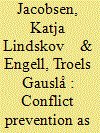

|
|
|
|
|
| Summary/Abstract |
Contemporary conflict prevention depends on information gathering and knowledge production about developments within the borders of a state, whose internal affairs have been deemed precarious by external actors. The international community, especially the United Nations (UN), calls this early warning and early action. However, for governments whose affairs are considered in need of monitoring, preventive endeavours—and the knowledge production they entail—can be seen as ‘early aggression’. In this article, we argue that seeing knowledge production as having power effects reveals contemporary conflict prevention as an interventionary practice. Through an analysis of the international community's preventive diplomacy vis-à-vis Burundi (2015–2016) we highlight three unintended power effects: privileging the UN's knowledge production created resistance to international involvement from the Government of Burundi, it led to a change in patterns of violence and to a backlash against the institutionalization of international monitoring beyond Burundi, and it enabled arguments for further, more forceful, intervention possibilities. This framing enables us to understand the recent return to conflict prevention not as a retreat from liberal interventionism, but as a pragmatic response to its purported crisis. Crucially, although conflict prevention falls short of military intervention, it nonetheless leaves important interventionist footprints.
|
|
|
|
|
|
|
|
|
|
|
|
|
|
|
|
| 2 |
ID:
110889
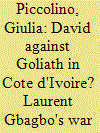

|
|
|
|
|
| Publication |
2012.
|
| Summary/Abstract |
While a doctrine of liberal interventionism seems to be gaining acceptance, it remains constrained by the resilience of state sovereignty and by the resistance of internal elites to externally driven prescriptions. This article looks at Côte d'Ivoire's tortuous peace process and at the recent post-electoral crisis, exploring how former Ivoirian President Laurent Gbagbo developed strategies for neutralizing the threat that international peacemaking and peacekeeping intervention posed to his rule. It is argued that a particular ideological discourse played a crucial role in Gbagbo's struggle against 'global governance'. Such a discourse combined the legalistic exaltation of state sovereignty, a fierce anti-colonial nationalism, and religious overtones in portraying the Ivoirian crisis as a 'war of second independence' against a wide range of international enemies. While nationalist rhetoric had been toned down after the conclusion of the Ouagadougou Political Agreement in 2007, the confrontation between Gbagbo and the international community reignited during the 2010-11 post-electoral crisis. A series of new developments - in particular the UN's certification mandate - rendered Gbagbo's political tactics and the recourse to nationalism ineffective and contributed to his fall.
|
|
|
|
|
|
|
|
|
|
|
|
|
|
|
|
| 3 |
ID:
086400
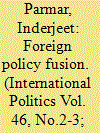

|
|
|
|
|
| Publication |
2009.
|
| Summary/Abstract |
Several tendencies in US foreign policy politics generated a new foreign policy consensus set to outlast the Bush administration. Three developments are analysed: increasing influence of conservative organizations - such as the Heritage Foundation, and of neoconservatism; and, particularly, democratic peace theory-inspired liberal interventionism. 9-11 fused those three developments, though each tendency retained its 'sphere of action': Right and Left appear to have forged an historically effective ideology of global intervention, an enduring new configuration of power. This paper analyses a key liberal interventionists' initiative - the Princeton Project on National Security - that sits at the heart of thinking among centrists, liberal and conservative alike. This paper also assesses the efficacy of the new consensus by exploring the foreign policy positions and advisers of President-elect Barack Obama and his defeated Republican rival, Senator John McCain, concluding that the new president is unlikely significantly to change US foreign policy.
|
|
|
|
|
|
|
|
|
|
|
|
|
|
|
|
| 4 |
ID:
099567
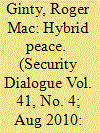

|
|
|
|
|
| Publication |
2010.
|
| Summary/Abstract |
This article is interested in the interface between internationally supported peace operations and local approaches to peace that may draw on traditional, indigenous and customary practice. It argues that peace (and security, development and reconstruction) in societies emerging from violent conflict tends to be a hybrid between the external and the local. The article conceptualizes how this hybrid or composite peace is constructed and maintained. It proposes a four-part conceptual model to help visualize the interplay that leads to hybridized forms of peace. Hybrid peace is the result of the interplay of the following: the compliance powers of liberal peace agents, networks and structures; the incentivizing powers of liberal peace agents, networks and structures; the ability of local actors to resist, ignore or adapt liberal peace interventions; and the ability of local actors, networks and structures to present and maintain alternative forms of peacemaking.
|
|
|
|
|
|
|
|
|
|
|
|
|
|
|
|
| 5 |
ID:
120454
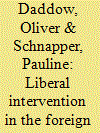

|
|
|
|
|
| Publication |
2013.
|
| Summary/Abstract |
David Cameron was a critic of Tony Blair's doctrine of the 'international community', which was used to justify war in Kosovo and more controversially in Iraq, suggesting caution in projecting military force abroad while in opposition. However, and in spite of making severe cuts to the defence budget, the Cameron-led Coalition government signed Britain up to a military intervention in Libya within a year of coming into office. What does this say about the place liberal interventionism occupies in contemporary British foreign policy? To answer this question, this article studies the nature of what we describe as the 'bounded liberal' tradition that has informed British foreign policy thinking since 1945, suggesting that it puts a distinctly UK national twist on conventional conservative thought about international affairs. Its components are: scepticism of grand schemes to remake the world; instinctive Atlanticism; security through collective endeavour; and anti-appeasement. We then compare and contrast the conditions for intervention set out by Tony Blair and David Cameron. We explain the similarities but crucially the vital differences between the two leaders' thinking on intervention, with particular reference to Cameron's perception that Downing Street needed to loosen its control over foreign policymaking after Iraq. Our argument is that policy substance, policy style and party political dilemmas prompted the two leaders to reconnect British foreign policy with its ethical roots, ingraining a bounded liberal posture in British foreign policy after the moral bankruptcy of the John Major years. This return to a pragmatic and ethically informed foreign policy meant that military operations in Kosovo and Libya were undertaken in quite different circumstances, yet came to be justified by similar arguments from the two leaders.
|
|
|
|
|
|
|
|
|
|
|
|
|
|
|
|
| 6 |
ID:
149224
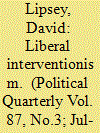

|
|
|
|
|
| Summary/Abstract |
David Lipsey analyses the arguments made by former Labour prime minister Tony Blair in his Chicago speeches for armed liberal intervention in states which are abusing the human rights of their citizens. He traces these arguments back to previous advocates of such intervention such as W. E. Gladstone and Woodrow Wilson. The arguments of Blair and advocates are often compelling in principle. However, in most cases—Iraq and Libya are examples—the practical consequences of military action turn out to be disastrous. Though opposing pacifism, and the ill-thought-out hostility to all things military of Labour's current leader Jeremy Corbyn, Lipsey's advice to those thinking of intervening is: don't.
|
|
|
|
|
|
|
|
|
|
|
|
|
|
|
|
| 7 |
ID:
094758
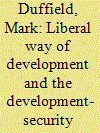

|
|
|
|
|
| Publication |
2010.
|
| Summary/Abstract |
As the rising death toll among humanitarian aid workers suggests, saving strangers has become a dangerous occupation. In addressing the consequences of this increase, this article begins by placing the development-security nexus in its historical context. While it has long been associated with liberalism, two factors distinguish this nexus today: first, the global outlawing of spontaneous or undocumented migration; second, the shift in the focus of security from states to the people living within them. Reflecting these moves, policy discourse now conceives development and underdevelopment biopolitically - that is, in terms of how life is to be supported and maintained, and how people are expected to live, rather than according to economic and state-based models. The household and communal self-reliance that forms the basis of this biopolitics, however, has long been in crisis. Since the end of the Cold War, the destabilizing forms of global circulation associated with this emergency have been reconstituted as threats to the critical infrastructures that support mass consumer society. A new security terrain now links the crisis of adaptive self-reliance with risks to critical infrastructure within a single framework of strategic calculation. Rather than ameliorating the generic life-chance divide between the global north and south, the development-security nexus is entrenching it.
|
|
|
|
|
|
|
|
|
|
|
|
|
|
|
|
|
|
|
|
|